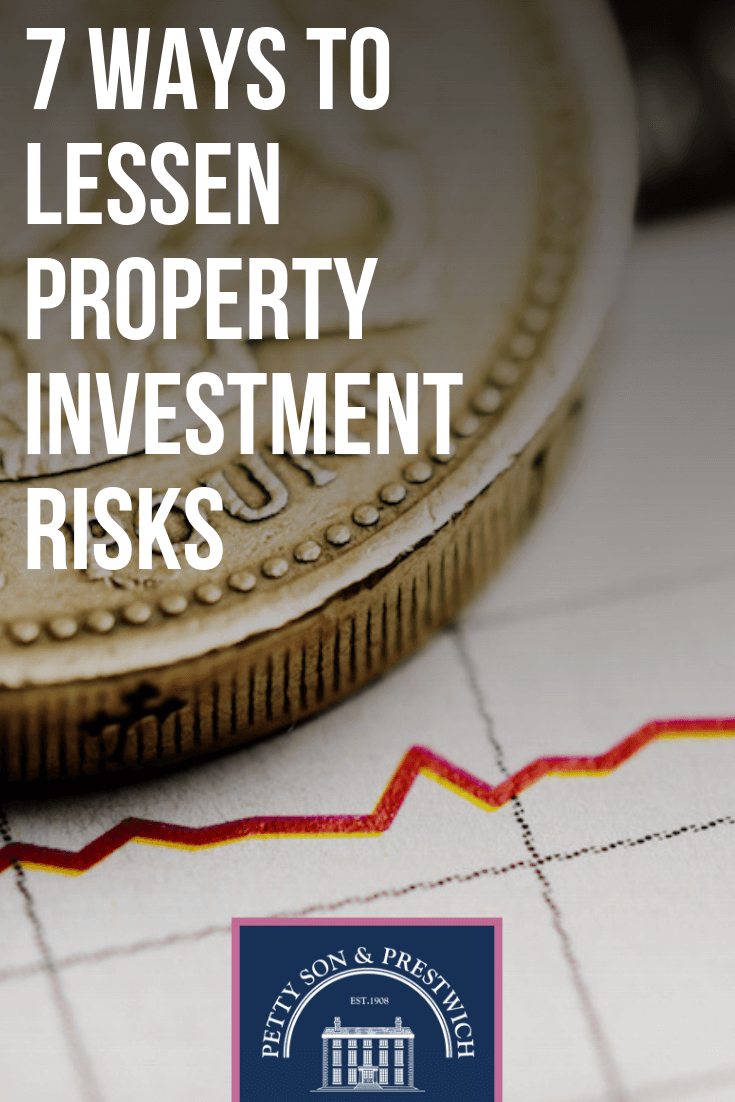Despite the doom and gloom found in certain corners of the media of late, buying property is still one of the best investments out there, and it’s a relatively safe way to see decent gains, especially long term. As with all other investments, though, it’s not entirely without risk.
You can, however, lessen the chances of things going belly up if you decide to enter the property market, something that can be difficult with other speculative ventures. This is where many people fall foul. They expect their investment to look after itself with very little effort, but that’s rarely the case.
Investing in property should not be seen as a hobby, but as a business. Businesses mitigate risk (at least the good ones do!), and you should look to do the same if you enter the property market as an investor.
With all this in mind, let’s take a look at some key anxieties and concerns would-be property investors have and offer up a few solutions along the way.
House prices could drop
This is a natural concern many newcomers to property investing have, and it’s not completely unwarranted. Sure, over the course of time, property generally increases, but what if your timing is slightly off? Buying property just before a crash is a genuine worry, and it’s difficult, if not entirely impossible, to predict and avoid.
That being said, there is still one thing you can do to lessen the risk: buy cheaply. Finding a bargain is essential if you want to mitigate potential market swings in the short term, and it can help you stay in business while others fail around you.
Think about it, if you can negotiate a deal to purchase your buy-to-let investment at 10% below market value, you’ll be giving yourself a 10% cushion against market fluctuations at the same time. It’s so obvious it warrants a ‘Duh!’, yet so many first-time landlords pay over the odds on their property investment. Don’t follow their lead.
Be patient. Do your homework, wait for the right property to hit the market, and act quickly when something suitable becomes available.
Interest rates could rise

Another obvious concern is rising interest rates. There’s been a lot of speculation lately over long-term interest rate increases, so caution here is prudent, but it certainly shouldn’t prevent you from making a move in the property market.
While it’s possible for interest rates to drop again (they’re currently at 0.75%, but were as low as 0.25% back in 2017), it’s is extremely unlikely in the foreseeable future. It would appear that the only way is up, for now at least.
So, what can you do to mitigate that? The obvious thing would be to fix your mortgage for a decent period and some lenders are offering 10-year fixes at the moment, which makes it possible to do so. You will, however, have to take into account the higher rate you’ll have to pay and any repayment fees you’d incur should you wish to buy yourself out of the deal early.
It’s also a good idea to factor in higher percentages when calculating your potential property’s viability. Running the numbers with a higher rate now to find out exactly what margin you have for an increase can throw up some surprising figures, and it’s always better to be surprised before you’ve laid out your money than after!
Already have property? If you’re of a mind to, you could start paying an increased interest rate before it happens to create an extra sink fund. After all, having a backup vault is always handy, regardless of what business you’re in.
My tenant might not pay me
This is a big one for many prospective landlords. The fear of not being paid can ultimately put people off of entering the property market as an investor altogether, but there are ways in which you can lower the risk associated with tenants failing to pay up.
Firstly, there’s insurance that goes by another name: a rent guarantee policy. As one would imagine, this basically covers the landlord so they don’t miss their payments, even if the tenant decides to stop handing over the monthly moolah. Taking out rent guarantee insurance can give you complete peace of mind, but it does come at a premium. However, many letting agents, Petty’s included, offer this cover as part of their property management service, and the charge is incorporated into your monthly fee.
Obtaining solid references will help ensure you don’t let to someone who has a history of non-payment. Referencing can be tough for the individual to assess but, again, a reputable letting agent will be able to offer this service to you.
Finally, there’s the long shot: upfront rent. This will not happen often, but it some rare cases you may be able to negotiate with your tenant to be paid up front in exchange for a reduced rental charge for them. This, however, usually only happens when you let to someone you already know or when time comes to renew an existing tenants tenancy.
Maintenance costs could leave me out of pocket

Things go wrong, there’s no avoiding that, unfortunately, but you can lessen the risk by being canny when you buy and not being cheap in the short term. Let me explain.
When you are looking for a buy-to-let property to invest in, check for obvious structural issues that could zap your profits before you’ve even found a tenant. Surveys can be worth their weight in gold here, but even a cursory glance at things like the roof (missing tiles), windows (poor seals, rotting woodwork), and walls (damp patches) will give you an idea of whether or not you’re going to need to spend a fortune just to make the place habitable.
Maintenance doesn’t stop at structural issues, though. White goods and boilers can pack up at any time, and you’ll have to foot the bill to repair or replace them. Many landlords make a big mistake here by thinking short term, opting for cheap appliances instead of paying a little bit extra for better quality items. Laying out more money than you need to may seem counterintuitive, but if it means fewer call outs and a longer lifespan for the goods in question it’s often worth the extra expense.
Getting a call from a tenant to say that such-and-such needs repairing or replacing never comes at a good time, so it’s vital you’re prepared for such eventualities. Some landlords opt for an insurance policy to cover such things, while others prefer to set up a sink fund. Which route you choose is completely up to you, but you must make sure you put something in place from the get-go.
The tenant could flood/burn down my property
It may sound melodramatic, but accidents of this nature do happen from time to time and for some prospective property investors this is a very real concern, albeit one that will occur very infrequently.
Obviously, insurance is going to be the best course of action here. You’ll need cover anyway to get your mortgage, but you can further protect your investment with a better policy than the minimum requirements needed to obtain financing.
On top of this, there’s the option of emergency landlord cover. Many see this as overkill, but for others it can bring peace of mind by covering issues such as leaks, boiler breakdowns, and the like.
I might not be able to find a tenant
Ahh, the dreaded void period. Not being able to find tenants is a worry for any landlord. After all, who wants to see expenses going out when nothing is coming in!
Doing your homework before investing is by far the best thing you can do to ensure that there is ample demand for your property. Look at other rentals of a similar ilk in the area. Are they being filled quickly of left languishing in agents windows for eons?
Also, look at where demand is coming from locally: Is it students? Young professionals? Corporate clients? Knowing the demographic of the majority of tenants in the area will help you choose the correct investment property to accommodate their needs and, therefore, avoid prolonged void periods.
Keeping abreast of local news and developments can give you an insight, too. How healthy is the biggest employer in the area? Is the local university expanding? Are there property developments proposed nearby that could weaken the rental market? All these things can be taken into account in order to gauge whether or not an investment is sound.
I might mess up legally

Landlord legislation is changing all the time and for anyone who isn’t immersed in the minutiae day-to-day it can seem incredibly overwhelming. Being compliant is more important than ever, with growing fines and threats of custodial sentencing being bandied about, but it’s also becoming more difficult to stay on the right side of the legal fence as the goalposts seem to change with every passing day.
This is where a good letting agent is going to earn their keep. Opting for full management service from a reputable agent who, preferably, is also ARLA Propertymark accredited (like we are here at Petty’s) will ensure that your business remains compliant and your investment isn’t at risk.
All of this may seem daunting, but the fact remains that buying property is still a sound investment, providing you know what you’re doing. If you feel as though you need a little more help or guidance, we’re always on hand. Our lettings and property management teams are experts in their field and our industry accreditations show our commitment to providing an exemplary service to all of our customers.
On top of this, we’ve been operating in East London for well over a century now and there’s no one locally who knows more about E11 and its surrounding areas than Petty’s. So, if you’re looking for property management advice or simply would like to list your letting with us, give us a call. We’d love to help.
